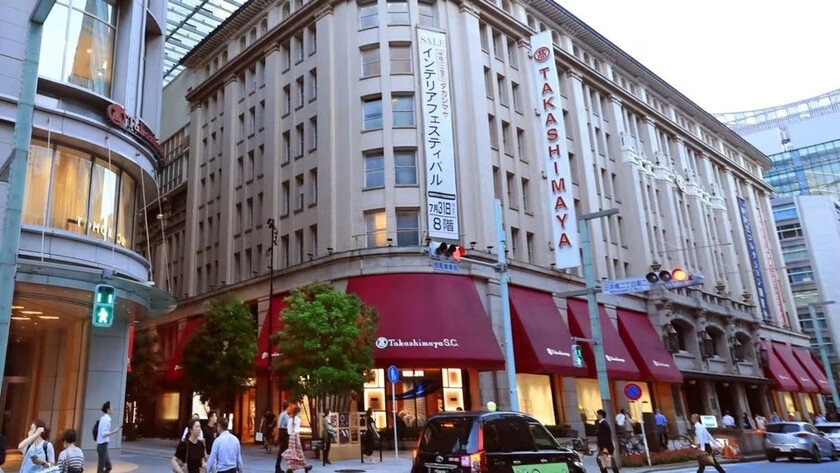A surge in tourist shopping is driving record sales at Japanese stores. The weak yen is boosting sales despite the fact that the number of Chinese tourists visiting Japan has yet to pick up, according to Nikkei Asia.

Shopping malls report that international tourists are buying high-end items in Japan. Photo: Nikkei.
Buy branded goods
According to November 2023 figures released by the Japan Retailers Association, monthly duty-free sales reached a record high of 39.49 billion yen (US$279 million) thanks to foreign tourists due to the weak yen, 2.3 times higher than the same month the previous year.
Takashimaya recently revised upwards its forecast for total operating revenue for the fiscal year ending in February, driven by strong spending from foreign tourists. The company expects record net income of 30 billion yen, a 7.8% increase from the previous fiscal year.
According to a Takashimaya spokesperson, tourists are buying high-end items from brands like Louis Vuitton, Chanel, and Hermes because "the weak yen makes it seem like a bargain." Foreign visitors are also exempt from Japan's consumption tax.
Isetan Mitsukoshi Holdings said its duty-free sales reached a record high in November 2023, following a similar increase in October 2023, with particularly strong consumer interest in luxury handbags, jewelry, and watches.
As of mid-December 2023, Isetan Mitsukoshi Holdings' duty-free sales were on track to surpass sales from November 2023. The company projected a net profit of 37 billion yen for the fiscal year ending in March.
Chinese tourists are returning slowly.
According to the Japan National Tourism Organization, the number of visitors to Japan in November 2023 was 2.44 million, a 2.6-fold increase compared to the previous year and exceeding 2 million for the sixth consecutive month. The total number of tourists from January to November 2023 was 22 million.
Data shows that the number of tourists from 13 countries and territories – including South Korea, Taiwan, Singapore, Vietnam, Australia, and the United States – reached a record high in November 2023. On the other hand, the number of Chinese tourists from January to November 2023 was 2.11 million, a decrease of 76.2% compared to the same period in 2019 (8.88 million).

Meiji Jingu Shrine in central Tokyo was packed with people on New Year's Eve as Japanese and foreign tourists flocked to shrines and temples across the Land of the Rising Sun to welcome the new year. Photo: Nikkei Asia.
Preliminary figures released by the government's Tourism Agency of Japan show that spending by foreign tourists reached 1.39 trillion yen between July and September 2023, a 17.7% increase compared to the same period in 2019.
For Takashimaya, spending by Chinese tourists accounted for 46.1% of total domestic sales between March and November 2023, a significant decrease from nearly 80% before the pandemic in 2019.
According to a Takashimaya spokesperson, the number of tourists from other parts of Asia has increased – such as Singapore, South Korea, Hong Kong, and Taiwan – and the number of young consumers has also risen.
According to the spokesperson, while there has been a return of individual tourists, group tours from China have not returned as much as expected. The spokesperson also mentioned political factors such as Japan's discharge of treated wastewater from the Fukushima Daiichi nuclear power plant into the ocean.
Keiji Kanda, a senior economist at the Daiwa Research Institute, assessed that regarding the increase in domestic tourism, "the impact of the weak yen is quite significant." The yen fluctuated around its lowest level in 33 years in 2023.
“Many things in Japan have become cheaper, making them more accessible to tourists,” Kanda told Nikkei Asia. Personal spending has increased as “tourists’ budgets have expanded when converting to yen.”
However, the return of Chinese tourists remains uncertain. Mr. Kanda noted that the anticipated recovery in group tourism, which resumed in August 2023, has been affected by Japan's decision to release treated wastewater from the Fukushima nuclear power plant later this month. Mr. Kanda believes the impact of the water release will eventually subside and expects a recovery in Chinese tourists.
Matsuya Ginza shopping center recently introduced a digital assistance service on the Chinese messaging app WeChat.
The continued growth in tourist spending may depend on the yen remaining at a low level. A Takashimaya spokesperson noted, “[We believe] the number of foreign visitors will continue at this level, but when the yen is higher, the growth rate may slow down.”

 VI
VI EN
EN

































